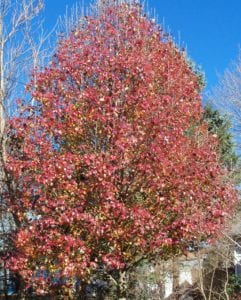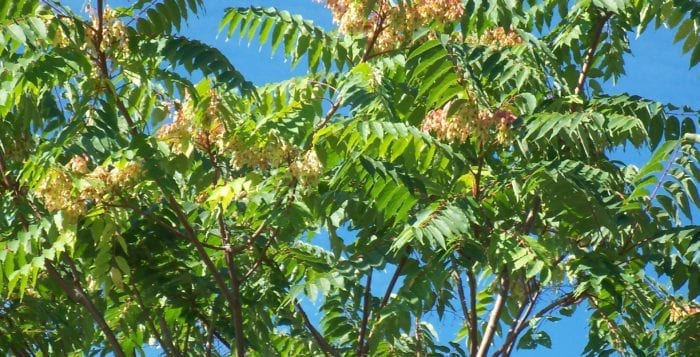By Ellen Barcel
Many people think of gardening as outdoor work: mowing a lawn, fertilizing, watering, planting, pruning, etc. And while this is true, doing your homework, i.e., research, before you select plants will make life a whole lot easier for you.
Fall is an ideal planting time. For one thing, it’s cooler so you’ll use less supplemental water. For another, you are getting a jump start on next year’s gardening. It generally takes three growing seasons for a new plant to settle in and flourish. If you plant in fall, that counts as the first year, a year where it will be accustomed to its new home. Next spring it will grow a more extensive root structure; and the third season you’ll have a gorgeous, healthy plant.
But, remember, no plant is perfect. So, you need to know each plant’s pros and cons before you plant. Here are some examples:
Trees
Maple trees have an extensive root system near to the surface that can play havoc with your lawn. Norway maple also puts out a tremendous amount of seeds, meaning seedlings are everywhere. That means doing a lot of weeding. Yes, they’re on Suffolk’s Do Not Sell List, but friends or neighbors may offer you some. “No thank you” is the perfect reply.
Ginkgo trees (the female ones) produce a lot of foul smelling fruit. Most nurseries will sell only male trees, but, you really need to make sure. Unless you plan to use the fruit, as some Oriental cooks do, you really don’t want a female tree.
Sweet gum trees produce spiky seed pods that seem to land everywhere. While this is a lovely shade tree and the seed pods are really interesting to look at, do you want to spend time cleaning them up from lawns, walkways and anything else that is near them? If you want the sweet gum and have a large enough piece of property, plant it near the back of your garden, away from walkways, etc.
Black walnut trees have the reputation of killing many plants near them by putting out toxic (to the plants) chemicals. This is known as allelopathy. They’re beautiful shade trees, which produce great nuts for eating, but are you ready to deal with this problem?

Ornamental pear trees have the nasty habit of splitting or having large chunks of the tree break off as the tree matures and grows older. They’re fast growing trees, with lovely white flowers in spring and burgundy leaves in late fall. Yes, they’re beautiful trees, but you need to be aware of this potential problem.
Native dogwood (Cornus florida) can develop the fungal disease anthracnose, which can actually kill the tree while it only makes maples look ugly. So, if this is a concern, grow another variety of dogwood, such as Kousa dogwood (which blooms about a month or two later than C. florida).
Tree of heaven (Ailanthus altissima) is considered a weed. It seeds itself everywhere and has a foul smell — hence its nickname “stink weed tree.” This is also on the Do Not Sell List because of its invasive nature but easily found growing wild.
Weeping willow trees have a shallow root system and can easily be blown over in storms. I lost two that way and decided to replace them with other trees. Also note that willow wood doesn’t have a nice aroma used in a fireplace. So, if you lose the tree in a storm, you can’t even use the wood. The roots also have the reputation of heading for water sources, potentially damaging structures, so shouldn’t be planted by pools, etc.
The dawn redwood, once considered extinct, is a lovely coniferous tree. However, it has one quality that you may not like — it is deciduous. Yes, this is a unique specimen which loses its needles in the fall. If you are looking for coniferous trees to create a year round hedge or screen, then the dawn redwood is not for you. Next week: researching perennials and shrubs.
Ellen Barcel is a freelance writer and master gardener. To reach Cornell Cooperative Extension of Suffolk County and its Master Gardener program, call 631-727-7850.





